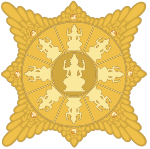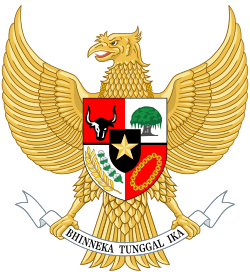Defenders of the Homeland
PETA (Indonesian: Pembela Tanah Air – Defenders of the Homeland) or Kyōdo Bōei Giyūgun (郷土防衛義勇軍) was an Indonesian volunteer army established on 3 October 1943 in Indonesia by the occupying Japanese. The Japanese intended PETA to assist their forces in opposing a possible invasion by the Allies. By the end of the war, there were a total of 69 battalions (daidan) in Java (around 37,000 men) and Sumatra (approximately 20,000 men). On 17 August 1945, the day after the Indonesian Declaration of Independence, the Japanese ordered the PETA daidan to surrender and hand over their weapons, which most of them did. The Indonesian Republic's newly declared President, Sukarno, supported the dissolution rather than turn the organisation into a national army as he feared allegations of collaboration had he allowed a Japanese-created militia to continue to exist.[2][3][4]
| Pembela Tanah Air | |
|---|---|
.svg.png) Colour used by PETA battalions | |
| Active | 3 October 1943 – 15 August 1945 |
| Country | Indonesia with a Malayan branch[1] |
| Allegiance | Imperial Japanese Army |
| Type | Infantry |
| Role | Defending Indonesia from Allied Invasion |
| Size | 66 Battalions in Java, 3 Battalions in Bali, and approx. 20,000 men in Sumatra |
| Nickname(s) | PETA |
| Colors | Purple, Green, Red & White |
During the Indonesian National Revolution, former PETA officers and troops, such as Suharto and Sudirman, formed the core of the fledgling Indonesia armed forces.
Structure of PETA
| Battalion | Battalion Commander (Daidancho) | Note | Officers of other ranks |
|---|---|---|---|
| I Labuan, Banten | Tubagus Achmad Chatib | Muslim cleric | Suhadisastra |
| II Malingping, Banten | E. Ojong Temaja | Muslim cleric | M.B. Sutman |
| III Serang, Banten | Syam'un | Muslim cleric | Zainul Falah |
| IV Pandeglang, Banten | Uding Sujatmadja | Mustaram | |
| I Harmoni, Djakarta | Kasman Singodimedjo | Graduate of RHS Former leader of JIB and MIAI | Mufraeni Mukmin Latief Hendraningrat |
| II Purwakarta, Djakarta | Surjodipuro | Mursid | |
| I Djampang Kulon, Bogor | R. Abdullah bin Nuh | Muslim cleric | Husen Aleksah |
| II Pelabuan Ratu, Bogor | M. Basuni | Muslim cleric | Mulja |
| III Sukabumi, Bogor | Kafrawi | Machmud | |
| IV Tjibeber, Tjiandjur, Bogor | R. Gunawan Resmiputro | M. Ishak Djuarsa | |
| I Tasikmalaja, Priangan | K.H. Sutalaksana | Muslim cleric | Abdullah Saleh |
| II Pangandaran, Priangan | K.H. Pardjaman | Muslim cleric | K. Hamid |
| III Bandung, Priangan | Iljas Sasmita | Permana Umar Wirahadikusumah | |
| IV Tjimahi, Priangan | Arudji Kartawinata | Graduate of MULO Former executive of PSII | Soeparjadi Poniman |
| V Garut, Priangan | R. Sofjan Iskandar | Katamsi Sutisna | |
| I Tjirebon | Abdulgani Surjokusumo | Rukman | |
| II Madjalengka, Tjirebon | R. Zaenal Asikin Judibrata | Suarman | |
| I Pekalongan | Iskandar Idris | Muslim cleric | Ajub |
| II Tegal, Pekalongan | K.H. Durjatman | Muslim cleric | Sumardjono |
| I Tjilatjap, Banjumas | R. Sutirto | R. Hartojo | |
| II Sumpiuh, Banjumas | R. Soesalit Djojoadhiningrat | Zaelan Asikin | |
| III Kroja, Banjumas | Sudirman | Graduate of Muhammadiyah teachers' training school Muhammadiyah school-teacher | Supardjo Rustam |
| IV Banjumas | Isdiman Gatot Subroto | Sarengat | |
| I Gombong, Kedu | R. Abdul Kadir Bambang Sugeng | R. Sutrisno | |
| II Magelang, Kedu | Muhammad Susman | Sugiardjo Supangkat | |
| III Gombong, Kedu | Djoko Kusumo | Slamet Achmad Yani Sarwo Edhie Wibowo | |
| IV Purworedjo, Kedu | Mukahar Ronohadikusumo | Tjiptoroso | |
| I Mrican, Semarang | R. Usman Sutrisno Sudomo | Sujadi | |
| II Weleri, Kendal, Semarang | R. Sudijono Taruno Kusumo | Suparman Sumahamidjaja | |
| I Pati | Kusmoro Hadidewo | ||
| II Rembang, Pati | Holan Iskandar | Sukardi | |
| III Djepara, Pati | Prawiro Atmodjo | Sukardji | |
| I Wates, Jogjakarta | D. Martojomeno | Sudjiono | |
| II Bantul, Jogjakarta | Mohammed Saleh | Graduate of higher teachers' training school Muhammadiyah school-teacher | Sugiono |
| III Pingit, Jogjakarta | Sundjojo Purbokusumo | Darjatmo Suharto | |
| IV Wonosari, Jogjakarta | Muridan Noto | Nudi | |
| I Manahan, Surakarta | R.M. Muljadi Djojomartono | Muslim cleric | Suprapto Sukawati Djatikusumo |
| II Wonogiri, Surakarta | K.H. Idris | Muslim cleric | Budiman |
| I Babat, Bodjonegoro | K.H. Masjkur Sudirman | Muslim cleric | Utojo Utomo |
| II Bodjonegoro | Masri | R. Rachmat | |
| III Tuban-Bodjonegoro | Sumadi Sastroatmodjo | Sumardjo | |
| I Madiun | Agus Tojib | Mumardjo | |
| II Patjitan, Madiun | Akub Gulangge | R. Subagijo | |
| III Ponorogo, Madiun | M. Sudjono | Sudijat | |
| I Tulungagung, Kediri | Sudiro | Tulus | |
| II Blitar, Kediri | Surachmad | Sukandar Suprijadi | |
| III Kediri | A. Judodiprodjo Sujoto Djojopurnomo | Mashudi Sudjono | |
| I Gunung Sari, Surabaja | Mustopo | Graduate of STOVIT Dentist | Masduki Abudardja |
| II Sidoardjo, Surabaja | R. Muhammad Mangundiprodjo | Bambang Juwono | |
| III Modjokerto, Surabaja | Katamhadi | Usman | |
| IV Gresik, Surabaja | K.H. Cholik Hasjim | Muslim cleric | Jondat Modjo |
| I Gondanglegi, Malang | K. Iskandar Sulaeman | Muslim cleric | Sumarto |
| II Lumadjang, Malang | M. Sujo Adikusumo | S. Hardjo Hudojo | |
| III Pasuruan, Malang | Arsjid Kromodihardjo | Slamet | |
| IV Malang | Imam Sudja'i | Sukardani | |
| V Probolinggo, Malang | Sudarsono | Sumitro | |
| I Kentjong, Djember, Besuki | Suwito Sudiro | Sukarto | |
| II Bondowoso, Besuki | K.H. Tahirruddin Tjokro Atmodjo | Muslim cleric | Rosadi |
| III Bentjuluk, Banjuwangi, Besuki | Sukotjo | Imam Sukarto | |
| IV Rambipundji, Djember-Besuki | Surodjo Astiklah | Subandi | |
| V Sukowidi, Banjuwangi, Besuki | R. Usman Sumodinoto | Sudarmin | |
| I Pamekasan, Madura | K.H. R. Amin Dja'far | Muslim cleric | R. Mohammad Saleh |
| II Bangkalan, Madura | Ruslan Tjakraningrat | Hafiludin | |
| III Batang-batang, Madura | Abdul Madjid | Achmad Basuni | |
| IV Ambunten, Sumenep, Madura | Abdul Hamid Mudhari | Muslim cleric | Suroso |
| V Ketapang, Madura | Trunodjojo | Mochamad Sabirin | |
| I Negara, Bali | I Made Putu | I Wayan Mudana | |
| II Tabanan, Bali | I Gusti Ngurah Gede Pugeng | Ida Bagus Tongka | |
| III Klungkung, Bali | Anak Agung Made Agung | I Made Geria |
Notable members of PETA
- Suharto
- Supriyadi
- Sudirman
- Soewirjo
- Gatot Soebroto
- Ibrahim Yaacob
References
- Bachtiar, Harsja W. (1988), Siapa Dia?: Perwira Tinggi Tentara Nasional Indonesia Angkatan Darat (Who is S/He?: Senior Officers of the Indonesian Army), Penerbit Djambatan, Jakarta, ISBN 979-428-100-X
- Sunhaussen, Ulf (1982) The Road to Power: Indonesian Military Politics 1945-1967 Oxford University Press, ISBN 0-19-582521-7
- Ricklefs, M.C. (1981) A History of Modern Indonesia, c. 1300 to the present. MacMillan, ISBN 0-333-24380-3
Notes
- Sani, Rustam (2008). Social Roots of the Malay Left. SIRD. p. 26. ISBN 9833782442.
- Ricklefs (1981), p. 194
- Sunhaussen (1982), pp. 2–4
- Bachtiar(1988), p. 12


